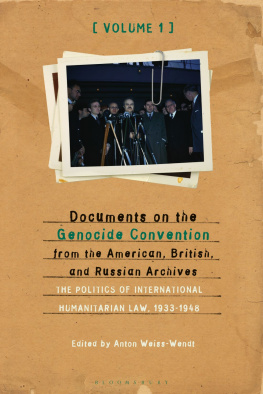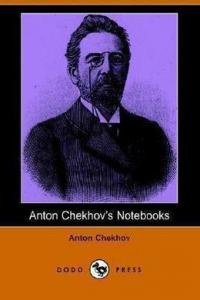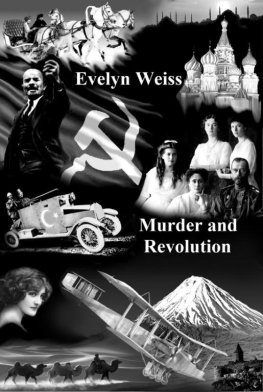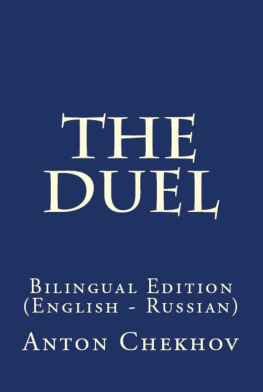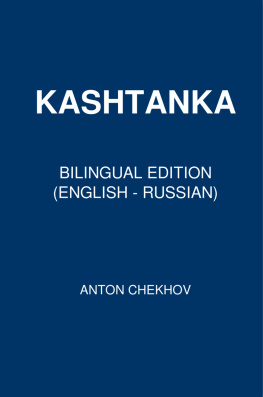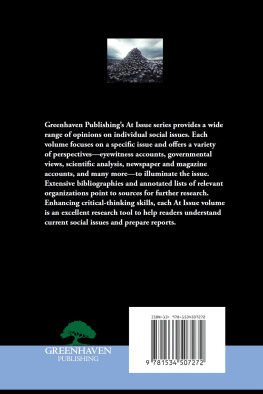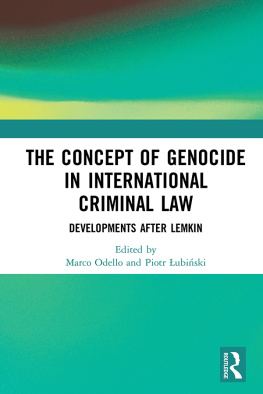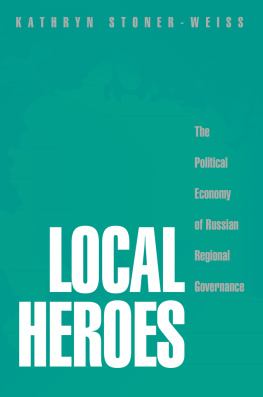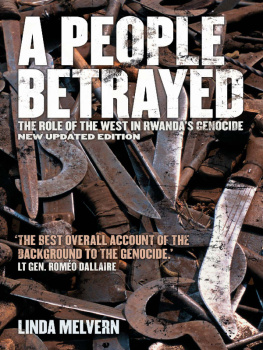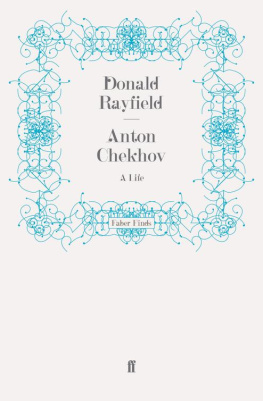Documents on the Genocide Convention from the American, British, and Russian Archives
Also available from Bloomsbury
The Holocaust in Eastern Europe , by Waitman Wade Beorn
Nazi Law , edited by John J. Michalczyk
The United States and the Nazi Holocaust , by Barry Trachtenberg
Documents on the Genocide Convention from the American, British, and Russian Archives
The Politics of International Humanitarian Law, 19331948
Volume I
Edited by
Anton Weiss-Wendt

Contents
DOCUMENTS 1169
DOCUMENTS 1169
I Genocide: From a Concept to a United Nations Resolution, 193346 (nos. 112)
No. 1
Raphael Lemkin Outlines the Concept of International Crimes of Barbarism and Vandalism, November 1933
No. 2
A Polish Right-Wing Newspaper Slams Lemkin for His Newly Proposed International Crimes of Barbarism and Vandalism, October 25, 1933
No. 3
Raphael Lemkin Informs Robert H. Jackson, US Supreme Court Associate Justice, of the Concept of Genocide and the Book, Axis Rule in Occupied Europe , May 4, 1945
No. 4
Robert H. Jackson Tells Raphael Lemkin He Had Read and Appreciated the Latters Book and the Article on Genocide, May 16, 1945
No. 5
James B. Donovan, Assistant to the Chief US Prosecutor at the International Military Tribunal in Nuremberg, Critical of Raphael Lemkins Performance at London, September 24, 1945
No. 6
Lemkins Memorandum for Telford Taylor, Assistant to the Chief US Prosecutor at the International Military Tribunal in Nuremberg, on Criminal Conspiracy, September 28, 1945
No. 7
Raphael Lemkin Considered as Potential Witness at the International Military Tribunal in Nuremberg, His Book Regarded as Prime Source on Genocide, October 11, 1945
No. 8
Raphael Lemkin Seeks Eleanor Roosevelts Support for His Idea of an International Genocide Treaty, Refers to His Earlier Communication to President Roosevelt, May 18, 1946
No. 9
The United Nations Department of Public Information Acknowledges the Receipt of Raphael Lemkins Proposal concerning the Crime of Genocide, May 23, 1946
No. 10
Legal Observers of Czechoslovakia, Poland, and Yugoslavia at the International Military Tribunal in Nuremberg Jointly Seek to Expand the Count of Genocide in the Indictment, June 25, 1946
No. 11
The Soviet Foreign Ministry Outlines an Agenda on Codification of International Law, November 6, 1946
No. 12
The UK Delegation to the United Nations Informs about the Draft Resolution Proclaiming Genocide an International Crime, November 23, 1946
II The United Nations Secretariat Draft Genocide Convention, 1947 (nos. 1342)
No. 13
British Foreign Office Officials Report on the UN Deliberations concerning the Crime of Genocide, Consider Unnecessary Drafting a Separate Convention, February 24and 26, 1947
GENOCIDE
No. 14
Conversation between Lemkin and Carl Marcy of the US State Department concerning the US Position on the UN Resolution on Genocide, February 25, 1947
No. 15
The British Foreign Office Prefers the UN Secretariat to Draw a Draft Genocide Convention, March 7, 1947
No. 16
The UK Permanent Representative to the United Nations Reports on Divergent Procedure for Drafting a Genocide Convention as Proposed by National Delegations, March 16, 1947
No. 17
The British Foreign Office Prefers Delayed Action on Genocide in the United Nations, March 17, 1947
No. 18
Raphael Lemkin Not Allowed to Participate in Formal Discussions On Genocide in the ECOSOC, April 4, 1947
No. 19
Soviet Foreign Minister Vyacheslav Molotov Briefed on Soviet Legislation pertaining to the Crime of Genocide, April 5, 1947
No. 20
Raphael Lemkin Thanks UN Secretary General Trygve Lie for His Assistance in Passing the UN Resolution That Proclaimed Genocide a Crime under International Law, May 6, 1947
No. 21
The UN Secretariat Seeks Names of Legal Experts Who Could Help Draw up a Genocide Convention, May 13, 1947
No. 22
Raphael Lemkin Invited to Serve as an Expert of International and Criminal Law in Drawing up a UN Draft Genocide Convention, May 13, 1947
No. 23
UK Representative, Professor James L. Brierly, Reports on the First Meeting of the UN Committee of Legal Experts, Eager to Dispose of the Idea of an International Criminal Court, May 15, 1947
No. 24
James Brierly Compares and Contrasts the British, American, and Soviet Outlook on Codification of International Law, as Transpires from the Work of the UN Committee of Legal Experts, May 27, 1947
No. 25
The British Foreign Office Welcomes the Decision to Delegate the Formulation of the Nuremberg Principles to the Newly Established International Law Commission, June 5, 1947
No. 26
Philip Jessup, US Representative on the UN Committee of Legal Experts, Speculates about Further Soviet Moves on the UN Secretariat Draft Genocide Convention, June 7, 1947
No. 27
US Representative on the UN Committee of Legal Experts Reports on the Secretariat Draft Genocide Convention, Cites Personal Differences between Raphael Lemkin, Vespasian Pella, and Henri Donnedieu de Vabres (excerpt), June 19, 1947
No. 28
James Brierly Concerned over Political Undercurrents in the Proposed International Law Commission, Critical of Soviet Obstructionism, July 7, 1947
No. 29
UN Secretary General Invites the Government of India to Comment on the Secretariat Draft Genocide Convention, July 7, 1947
No. 30
Raphael Lemkin Seeks Support of Hartley W. Shawcross, Attorney General for England and Wales, in Passing the Genocide Convention, July 8, 1947
No. 31
Eric Beckett of the British Foreign Office Concurs with Professor Brierlys Pessimistic View on the Codification of International Law, Criticizes the Soviet Postulate of International Law, July 7, 1947
No. 32
Attorney General for England and Wales Hartley W. Shawcross Prefer Disposing of the Question of Genocide as a Declaratory Resolution, Dismissive of Raphael Lemkin, July 21, 1947
No. 33
Con D. W. ONeill of the British Foreign Office Considers the Secretariat Draft Genocide Convention a Political Document, Regrets UKs Commitment, July 29, 1947
No. 34
The UK Delegation to the United Nations Raises an Issue of Possible Execution of British Soldiers in Palestine in the context of the Ongoing Debate on Genocide, July 30, 1947
No. 35
Gerald Fitzmaurice of the British Foreign Office Concurs with the Opinion That the Genocide Convention is a Political Document, Suggests Submitting No Formal Comments on the Secretariat Draft, August 11, 1947
No. 36
The United States Favors a Speedy Passage of the Genocide Convention during the Present Session of the UN General Assembly, August 27, 1947
No. 37
US State Department Officials Confidentially Discuss the Contested Issues in the Secretariat Draft Genocide Convention, September 4, 1947
No. 38
Ernest Gross and Dean Rusk Prepare US Commentary on the Secretary Draft Genocide Convention, September 10, 1947
No. 39
The British Commonwealth Relations Office Criticizes the Secretariat Draft Genocide Convention, Informs of the Guidelines Issued for the UK Delegation to the United Nations, October 6, 1947
No. 40
Raphael Lemkin Argues That Genocide Does Not Come under Crimes against Humanity and/or the Nuremberg Principles, November 9, 1947
No. 41

